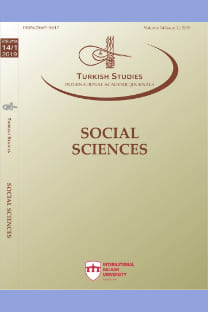FROM PAST TO PRESENT; EVOLUTION OF THE LOGOS: APPLE, SHELL & COCA COLA CASES
GEÇMİŞTEN GÜNÜMÜZE LOGONUN EVRİMİ: APPLE, SHELL & COCA COLA ÖRNEKLERİ
___
Adams, S., Morioka, N., & Stone, T. L. (2006). Logo design workbook: a hands-on guide to creating logos. Gloucester, MA.: Rockport.Adir, G., Adir, V., & Pascu, N.E. (2012). Logo design and the corporate identity. Procedia-Social and Behavioral Sciences, Vol.51, (650- 654)
Alıcı, B. & Aydınlıoğlu, Ö. (2017). “Dijital Dönem Türk Korku Sinemasında Marka Yerleştirme”. Editör: Ali Murat Kırık. Medya Çağında İletişim: Sokaktan Ekrana, Sanaldan Gerçeğe İçinde. İstanbul: Çizgi Kitabevi, ss.289-317.
Alıcı, B. & Aydınlıoğlu, Ö. (2017). “Animated Movies and Child in the context of Consumerist Society” Contemporary Studies in Social, Economic & Financial Analysis İçinde (Edited by: Sadullah Çelik, Osman Küçükahmetoğlu, Julia Dobreva) pp.87-113. London: İjopec Publication.
Aziz, J. T. (2013, November 28). The evolution of the Apple logo. http://blogs.tribune.com.pk/story/19792/the-evolution-of-the-apple-logo/ (Accessed May 31, 2017)
Apple Gazette, (2011, February 27). A Visual History of the Apple Logo. http://www.applegazette.com/apple-inc/a-visual-history-of-the-apple-logo/ (Accessed May 31, 2017)
Bontour, A. & Lehu, J-M. (2002). Lifting de Marques. Paris: Editions d'Organisation
Cass, J. (2008, April 18). A Comparative Study of Logo Design between the 70s and 90s. http://justcreative.com/2008/04/18/a-comparative-study-of-logo-design-between-the-70s- and90s/ (Accessed March 21, 2017)
Chevalier, M., & Mazzalovo, G. (2004). Pro logo: Brands as a factor of progress.New York: Palgrave Macmillan.
Çam, A. T. (2006). Türk Grafik Tasarımcıları: ‘LOGO’. İstanbul: Alternatif Yayıncılık
Durmaz, Ö. (2008). Logo Taasrımı Üzerine Profesyonellerden Görüşler. Grafik Tasarım Dergisi, Vol.27, Aralık Sayısı.
Dündar, F. N., (2013). Görsel Kimliğin Kutrum İmajına Etkileri. Organı̇ zasyon ve Yönetı̇ m Bı̇lı̇ mlerı̇ Dergı̇ sı̇ , 5, Vol.5, Issue.2: (91-101).
Edell, (2004). Journal of Current Issues and Research in Advertising,
Frith, Holden. “Unraveling the tale behind the Apple logo.” CNN, Cable News Network, 7 Oct. 2011, edition.cnn.com/2011/10/06/opinion/apple-logo/index.html. (Accessed 15 Sept. 2017).
Henderson, P. W., & Cote, A. (1998). Guidelines for selecting or modifying logos.Journal of Marketing, Vol.62, (14-30).
Irimia, R. & Gottschling, M. (2016) Taxonomic revision of Rochefortia Sw. (Ehretiaceae, Boraginales). Biodiversity Data Journal 4: e7720. https://doi.org/10.3897/BDJ.4.e7720. (n.d.). doi:10.3897/bdj.4.e7720.figure2f
Keller, L. & Lane, K. (2003), Strategic Brand Management, Building, Measuring and Managing Brand Equity. 2nd ed. Upper Saddle River, NJ: Prentice Hall
Know Logo. (2011). https://designaction.org/wp-content/uploads/2011/12/logo- inal.pdf (ed March 21, 2017)
Landa, R. (1996). Graphic Design Solutions. U.S.: Delmar Publishing
Lehu, J-M. (2004). Back to life! Why brands grow old and sometimes die and what managers then do: an exploratory qualitative research put into the French context. J Mark Commun, Vol.10, (133- 152).
Matusitz, J. & Cowin, E. (2014). An Evolutionary Examination of the Royal Dutch Shell Logo: Semiotic Perspective, Journal of Creative Communications, Vol.9, Issue.2: (93- 105).
Naomi, K. (2000). No Logo. Ankara: Bilgi Yayınevi
Park, C., Eisingerich, A,. & Pol, G. (2013, October 22). The Power of a Good Logo. http://sloanreview.mit.edu/article/the-power-of-a-good-logo/ (Accessed March 21, 2017).
Park, C., Eisingerich, A., Pol, G. & Park, J. (2013). “The Role of Brand Logos in Firm Performance,” Journal of Business Research Vol.66, Issue.2: (180-187).
Perry, A., & Wisnom, D. (2003). Markaların DNA’sı: Eşsiz ve Dayanıklı Markalar Yaratmanın Kuralları. Çev. Zeynep Yılmaz İstanbul: Mediacat Press
Pimentel, R, & Heckler S. (2003). Changes in logo designs: chasing the elusive butterfly curve. In: Scott LM, Batra R, editors. Persuasive imagery: a consumer response perspective. Mahwah, NJ: Lawrence Erlbaum Associates: (105–27).
Staff, J. (Not dated). The Coca-Cola logo story. http://www.coca- cola.co.uk/stories/the-logo-story (Accessed May 31, 2017)
The Guardian, Guardian News and Media, (29 Mar. 2006). Beatles sue Apple over trademark. www.theguardian.com/technology/2006/mar/29/news.newmedia. (Accessed Sept. 14, 2017)
Think Marketing, (2012, November 16). Apple Logo Evolution Story. https://thinkmarketingmagazine.com/apple-logo-evolution-story/ (Accessed May 31, 2017)
The Coca-Cola logo story. (Not dated). http://www.coca-cola.co.uk/stories/the-logo- story (Accessed September 06, 2017)
The 130-year Evolution of the Coca-Cola logo. (2016, December 05). http://www.cocacolajourney.com.au/stories/trace-the-130-year-evolution-of-the-coca-cola- logo (Accessed September 06, 2017)
The Shell brand. (Not dated). http://www.shell.com.au/about-us/the-shell-brand.html (Accessed September 09, 2017)
Okay, A., (2002). Kurum Kimliği, 3.bs., İstanbul: MediaCat Wallace, R. (2001). Proving our value: Measuring package design's return on investment. Design Management Journal, Vol.12, Issue.3: (20–27).
Vardar, N. (2004). Bana Yeni Bir Ben Lazım, Marketing Türkiye Dergisi, Vol.60, Aralık Sayısı
- ISSN: 2667-5617
- Yayın Aralığı: 6
- Başlangıç: 2006
- Yayıncı: ASOS Eğitim Bilişim Danışmanlık Otomasyon Yayıncılık Reklam Sanayi ve Ticaret LTD ŞTİ
PARTIARCHAL DISCOURSES, POLIGAMOUS LIVES: THE SYRIANS LIVING IN ANTAKYA
TÜRKİYE ÜZERİNE TARİHSEL SOSYOLOJİK BİR TARTIŞMA: YAPI, ÖZNE VE KONJONKTÜRÜN DİYALEKTİK BİRLİKTELİĞİ
Armağan ÖZTÜRK, Hatice KARAKUŞ ÖZTÜRK
OECD ÜLKELERİNDE İKİZ AÇIK HİPOTEZİNİN GEÇERLİLİĞİ: PANEL VERİ ANALİZİ
MU'TEZİLÎ LİTERATÜRE GÖRE EBÛ HANİFE’NİN MEZHEBÎ KİMLİĞİ
GEÇMİŞTEN GÜNÜMÜZE LOGONUN EVRİMİ: APPLE, SHELL & COCA COLA ÖRNEKLERİ
FROM PAST TO PRESENT; EVOLUTION OF THE LOGOS: APPLE, SHELL & COCA COLA CASES
KİŞİLİK ÖZELLİKLERİ VE PSİKOLOJİK SERMAYENİN AKIŞ ÇERÇEVESİNDE ÇEŞİTLİ DEĞİŞKENLERLE OLAN İLİŞKİSİ
